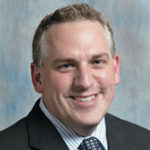Key takeaways from HTU’s Executive Pharmacy Exchange

Data analytics, workforce challenges and pharmacist leadership are key areas of interest for managing today’s pharmaceutical enterprise. These topics were covered in the Executive Pharmacy Exchange panel discussion at the HealthTrust University Conference in July.

Moderated by Aigner George, PharmD, AVP, Pharmacy Solutions at HealthTrust, the discussion featured pharmaceutical leaders from HealthTrust and two member organizations who provided their insights: Michael Epshteyn, PharmD, MSM, VP of Pharmacy Services, HealthTrust Supply Chain, Gulf Coast Division of HCA Healthcare, and Jonathan Lakamp, PharmD, BCPS, Chief Pharmacy Officer for Mercy Health. Heather Weese, , PharmD, MBA, MSF, MSHI, BCPS, BCPPS, FACHE, VP of Pharmacy for Community Health Systems also contributed content.
Data analytics are fundamental to providing intelligence
The plethora of data available to pharmacy practices is a treasure trove that can be used to tell the pharmacy’s story, often through data visualization. Lakamp uses data visualization tools to “make sure the right data feeds into the data model at my fingertips in near real time, to really bring it together in one place.” It doesn’t matter which data tool is chosen, as long as the organization supports and makes use of it.

Epshteyn shares that his organization uses Power BI to compare specific drug usage in multiple contexts, including current versus prior years, as well as utilization per facility. From this data, leaders can then determine if and what protocol changes should be made. A system like this collects data from different sources, displaying it in one place. Being able to access the information this way, “instead of trying to print multiple manual reports and do the crosswalks,” allows leaders to provide monthly reports quickly and accurately to the CFO, Epshteyn says.

Epshteyn also uses data and analytics to prevent drug stockouts and improve the nursing experience. Since switching to a web-based platform for the automated dispensing cabinets, they can anticipate stockouts and address any issues. He presents data to nursing executives at the division level, “because they’re very concerned with how disruptive it would be for nursing colleagues if they had 10 to 20 medications to administer to the patient with the morning pass, and one or two of them were not available,” he explains. The data helps them advocate for appropriate pharmacy staffing, and to be proactive about refilling items before stockouts happen.
Workforce challenges
The 2022 American Society of Health System Pharmacists National Survey of Pharmacy Practice in Hospital Settings study showed that 64.4% of hospitals were using pharmacists to fill some technician responsibilities and shifts, and in another study showed that 25% of pharmacy technicians were likely to leave their employer within 12 months. Combined with increasing pharmacist shortages and other labor challenges, this is a big issue for hospitals, George shares.
Addressing the issue head on
One of the ways HCA Healthcare is working to address this is by conducting employee engagement surveys twice a year, says Epshteyn. From these surveys, he’s seen that pharmacists have an interest in career development for different titles and responsibilities, not just for increased financial compensation. In response, HCA Healthcare has established additional pharmacy positions, including the advanced clinical pharmacist role, to recognize those who have completed a residency and become board certified. “We want a way to reward colleagues who are taking that additional step in continuing to grow, but also offer additional value to the organization,” Epshteyn says.
HCA Healthcare is also offering different residency types, including a management leadership residency. In addition, it is starting a combined two-year residency and master’s degree program in partnership with the University of Houston. “The main goal is to develop our own leaders that we’re going to retain as employees. We don’t want them to leave,” Epshteyn says.
Lakamp shares the importance of ensuring that pharmacists are working in a professional environment. Allowing them greater responsibilities, like participating in clinical care, is one way to do this. Mercy added some dedicated clinical specialist roles, in addition to staff pharmacist roles. Some pharmacists want to take on leadership roles managing others, but not all do. Those who want non-management advancement opportunities can be put in charge of a process or take on additional responsibilities at off-site locations, with new titles and additional compensation.
Technician shortages are also top of mind. Lakamp has focused on recruiting and retention efforts like increasing compensation and modifying career ladders. Some technicians are pharmacy or nursing students, and their time in the role is limited. Others have a career role in the unit, so providing growth opportunities is important. Mercy introduced specialist roles for those demonstrating different competencies, such as sterile compounding or chemotherapy. They have different levels for technicians in purchasing and procurement, with additional responsibilities or the chance to manage people. “It illustrates what we can do to support our techs more professionally,” Lakamp explains.
Even within the confines of a hospital, pharmacists need to share what they’re doing with other departments and with leadership overall. It’s important to communicate the pharmacy’s strategic vision and accomplishments outside of the team, so other service lines understand the positive impact and efforts the pharmacy is making. With all departments interested in funding for raises and projects, pharmaceutical leadership must be part of the solution. That might mean finding ways to save on drug costs and letting other leadership know how that was done, to help fund internal pharmacy priorities. Communicating these efforts can help a pharmacy advocate for its staff members, including for new titles and compensation.
Listen to the HTU program by clicking on the program title. For more information on HealthTrust Pharmacy Solutions, contact aigner.george@healthtrustpg.com or your HealthTrust Account Manager.
Share Email Employee Retention, HTU, Q4 2023, Staffing





